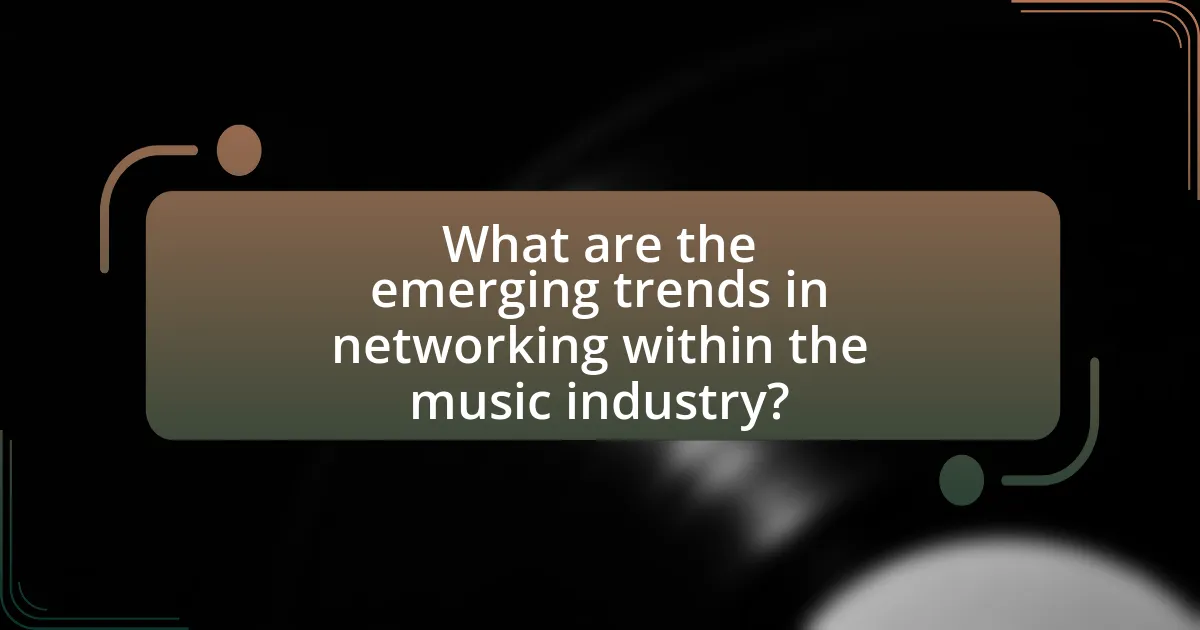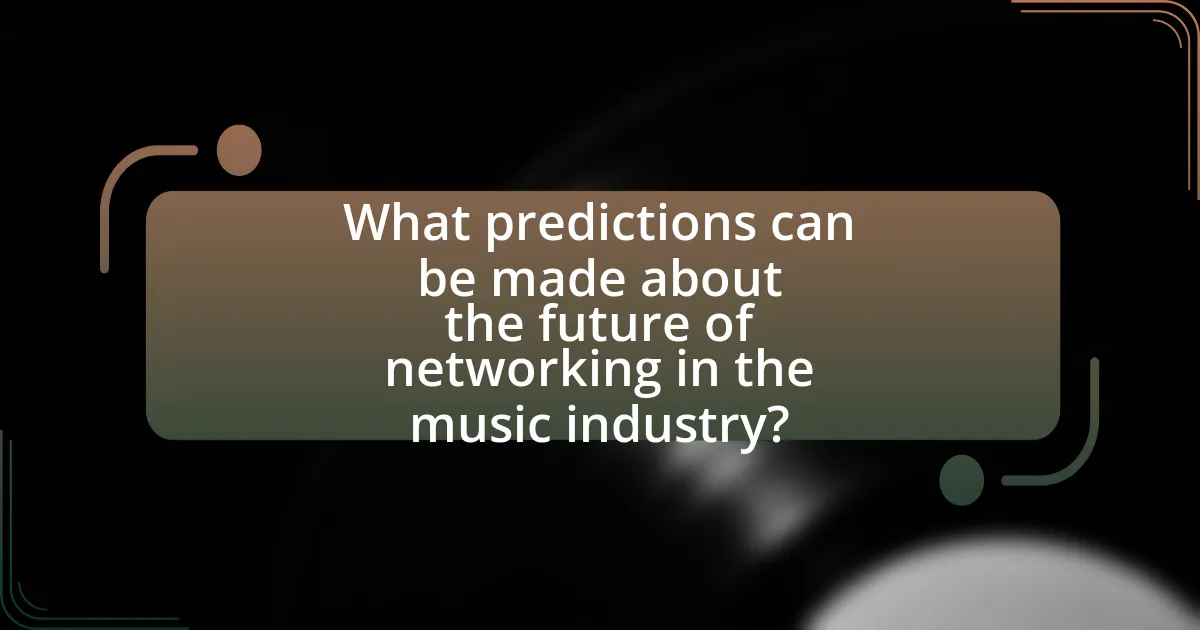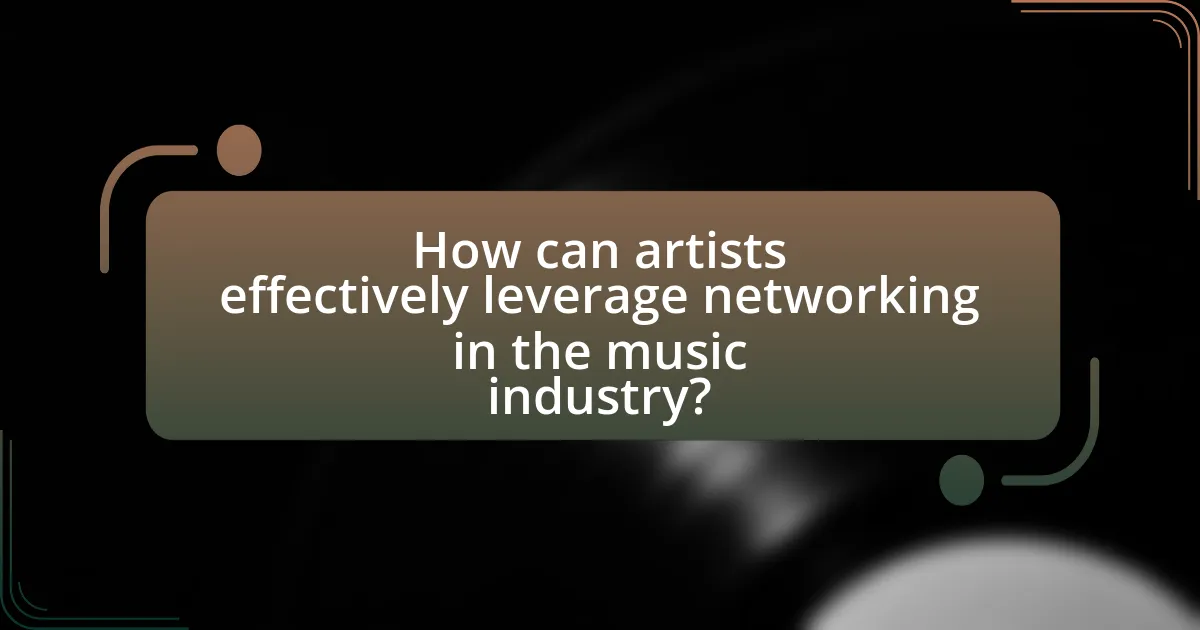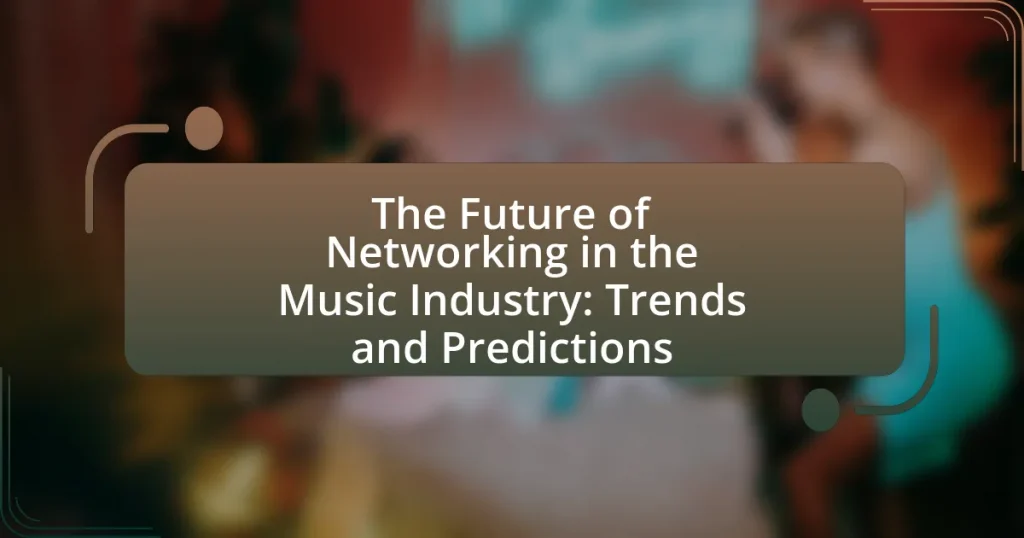The article focuses on the evolving landscape of networking within the music industry, highlighting emerging trends such as digital collaboration platforms, social media promotion, and blockchain technology for rights management. It examines how technology reshapes networking by facilitating connections among artists, producers, and fans, while also discussing the significant role of streaming services in fostering collaborations. Additionally, the article explores new networking opportunities through virtual events and online collectives, the impact of artificial intelligence on artist-fan interactions, and best practices for artists to effectively leverage networking strategies. Overall, it provides insights into the future of networking in the music industry, emphasizing the importance of data-driven approaches and authentic relationship-building.

What are the emerging trends in networking within the music industry?
Emerging trends in networking within the music industry include the rise of digital platforms for collaboration, the use of social media for artist promotion, and the integration of blockchain technology for rights management. Digital platforms like Splice and SoundBetter facilitate remote collaboration among artists and producers, allowing for a global exchange of ideas and creativity. Social media platforms, such as Instagram and TikTok, have become essential for artists to connect with fans and promote their work, significantly impacting music discovery and marketing strategies. Additionally, blockchain technology is being adopted to ensure transparency and security in music rights management, enabling artists to receive fair compensation for their work. These trends reflect a shift towards more decentralized and technology-driven networking methods in the music industry.
How is technology reshaping networking in the music industry?
Technology is reshaping networking in the music industry by enabling artists, producers, and fans to connect more efficiently through digital platforms. Social media platforms like Instagram and TikTok allow musicians to share their work and engage with audiences directly, fostering relationships that were previously limited to traditional media channels. Additionally, streaming services such as Spotify and Apple Music provide analytics that help artists understand their audience demographics and preferences, facilitating targeted marketing and collaboration opportunities. The rise of virtual events and online collaborations, especially during the COVID-19 pandemic, has further transformed networking by allowing artists to perform and connect globally without geographical constraints. These advancements illustrate how technology is not only enhancing visibility but also creating new avenues for collaboration and community building within the music industry.
What role do social media platforms play in music networking?
Social media platforms serve as crucial tools for music networking by facilitating connections between artists, fans, and industry professionals. These platforms enable musicians to share their work, engage with audiences, and collaborate with other artists, thereby expanding their reach and influence. For instance, a study by the International Journal of Music Business Research found that 70% of musicians use social media to promote their music and connect with fans, highlighting its significance in modern music networking. Additionally, platforms like Instagram and TikTok have become essential for viral marketing, allowing songs to gain popularity through user-generated content and trends, further demonstrating the impact of social media on the music industry.
How are streaming services influencing artist collaborations?
Streaming services are significantly influencing artist collaborations by providing platforms that facilitate easier access to a global audience and promote cross-genre partnerships. These services, such as Spotify and Apple Music, utilize algorithms that recommend music based on user preferences, encouraging artists to collaborate with others outside their usual genres to reach new listeners. For instance, the rise of collaborative playlists and features like Spotify’s “Blend” allow artists to merge their fan bases, leading to increased exposure and potential revenue. Additionally, data analytics from these platforms enable artists to identify trending genres and popular collaborators, further driving strategic partnerships.
What new networking opportunities are available for artists?
New networking opportunities for artists include virtual collaboration platforms, social media networking, and online artist collectives. Virtual collaboration platforms like Soundtrap and BandLab allow artists to create and share music remotely, fostering connections across geographical boundaries. Social media platforms, particularly Instagram and TikTok, have become essential for artists to showcase their work and engage with audiences, leading to potential collaborations and partnerships. Additionally, online artist collectives, such as The Creative Independent, provide forums for artists to connect, share resources, and collaborate on projects, enhancing their visibility and networking potential in the industry.
How are virtual events changing the landscape of music networking?
Virtual events are transforming music networking by providing accessible platforms for artists, industry professionals, and fans to connect regardless of geographical barriers. These online gatherings facilitate real-time interactions through live performances, Q&A sessions, and networking lounges, allowing participants to engage in meaningful conversations and collaborations. For instance, platforms like Zoom and Twitch have hosted virtual music festivals that attracted thousands of attendees, demonstrating the potential for widespread reach and engagement. Additionally, data from a 2021 survey by Eventbrite indicated that 70% of event organizers planned to continue hosting virtual or hybrid events post-pandemic, highlighting the sustained interest in these formats for networking opportunities in the music industry.
What impact do music festivals have on networking among artists?
Music festivals significantly enhance networking among artists by providing a platform for collaboration, exposure, and relationship-building. These events gather diverse musicians, allowing them to connect, share ideas, and potentially collaborate on future projects. For instance, festivals like Coachella and Glastonbury have historically facilitated partnerships between emerging and established artists, leading to increased visibility and opportunities in the industry. Additionally, the informal atmosphere of festivals encourages spontaneous interactions, which can result in lasting professional relationships. Studies indicate that artists who participate in festivals often report increased bookings and collaborations post-event, underscoring the festivals’ role in fostering a vibrant networking environment.

What predictions can be made about the future of networking in the music industry?
The future of networking in the music industry will increasingly rely on digital platforms and data-driven strategies. As streaming services dominate music consumption, artists and labels will utilize advanced analytics to understand audience preferences and optimize marketing efforts. For instance, platforms like Spotify and Apple Music already provide insights into listener demographics and behaviors, enabling targeted promotions. Additionally, social media will continue to play a crucial role in artist-fan engagement, with tools like TikTok driving viral trends and music discovery. The rise of virtual reality and augmented reality experiences will also transform networking opportunities, allowing artists to connect with fans in immersive environments. These trends indicate a shift towards more personalized and interactive networking methods, enhancing both artist visibility and fan loyalty.
How will artificial intelligence affect networking in music?
Artificial intelligence will significantly enhance networking in music by enabling more efficient connections between artists, producers, and audiences. AI algorithms can analyze vast amounts of data to identify trends, preferences, and potential collaborations, facilitating targeted networking opportunities. For instance, platforms like Spotify and SoundCloud utilize AI to recommend artists to listeners based on their listening habits, thereby fostering connections that might not occur organically. Additionally, AI-driven tools can streamline the process of finding collaborators by matching artists with similar styles or complementary skills, as seen in services like LANDR and Amper Music. This data-driven approach not only optimizes networking but also increases the likelihood of successful partnerships in the music industry.
What potential does AI have for connecting artists and fans?
AI has significant potential for connecting artists and fans by enabling personalized interactions and enhancing engagement. Through data analysis, AI can tailor recommendations for music and events based on individual preferences, thereby fostering a deeper connection between artists and their audience. For instance, platforms like Spotify utilize AI algorithms to curate playlists that resonate with users, increasing the likelihood of fans discovering new artists. Additionally, AI-driven chatbots can facilitate real-time communication, allowing fans to interact with artists directly, ask questions, and receive updates, which enhances the overall fan experience. This capability is supported by research from the International Journal of Information Management, which highlights that personalized content increases user engagement by up to 80%.
How might AI tools change the way artists collaborate?
AI tools will significantly enhance collaboration among artists by facilitating real-time communication, automating repetitive tasks, and providing data-driven insights. These tools enable artists to share ideas and resources instantly, regardless of geographical barriers, thus fostering a more inclusive creative environment. For instance, platforms like Splice allow musicians to collaborate on projects by sharing samples and tracks seamlessly. Additionally, AI can analyze trends in music consumption, helping artists make informed decisions about their collaborations and target audiences. This shift towards data-informed collaboration is supported by research from the Berklee College of Music, which highlights how technology is reshaping creative processes in the music industry.
What shifts in audience engagement can we expect?
Shifts in audience engagement will increasingly focus on personalized experiences and interactive platforms. As technology advances, audiences will expect tailored content that resonates with their preferences, leading to a rise in data-driven strategies for engagement. For instance, a report by Nielsen indicates that 70% of consumers prefer brands that offer personalized experiences. Additionally, the integration of virtual and augmented reality in music events is projected to enhance audience interaction, creating immersive experiences that foster deeper connections between artists and fans. This evolution reflects a broader trend towards community-driven engagement, where audiences actively participate in content creation and sharing, further solidifying their relationship with the music industry.
How will fan interactions evolve with new networking tools?
Fan interactions will evolve significantly with new networking tools by enabling more personalized and direct communication between artists and their audiences. These tools, such as social media platforms, live streaming services, and fan engagement apps, facilitate real-time interactions, allowing fans to participate in Q&A sessions, live chats, and exclusive content sharing. For instance, platforms like Discord and Patreon have already transformed how artists connect with their fanbase, fostering community building and enhancing loyalty. According to a report by Midia Research, 70% of fans prefer direct engagement with artists over traditional media, highlighting the demand for these innovative networking tools.
What role will data analytics play in shaping networking strategies?
Data analytics will play a crucial role in shaping networking strategies by enabling music industry professionals to make data-driven decisions that enhance collaboration and audience engagement. By analyzing listener preferences, streaming patterns, and social media interactions, stakeholders can identify key trends and optimize their networking efforts. For instance, a study by Nielsen Music found that 70% of music listeners engage with artists on social media, highlighting the importance of targeted outreach based on data insights. This analytical approach allows for more effective partnerships and promotional strategies, ultimately driving growth and innovation in the music industry.

How can artists effectively leverage networking in the music industry?
Artists can effectively leverage networking in the music industry by actively engaging with industry professionals, attending events, and utilizing social media platforms. Engaging with industry professionals, such as producers, managers, and fellow musicians, allows artists to build relationships that can lead to collaboration opportunities and increased visibility. Attending music festivals, conferences, and workshops provides artists with direct access to key players in the industry, facilitating face-to-face interactions that can strengthen connections. Additionally, utilizing social media platforms like Instagram, Twitter, and LinkedIn enables artists to showcase their work, share updates, and connect with a broader audience, including fans and industry insiders. According to a 2021 survey by the Music Industry Research Association, 70% of music professionals believe that networking is essential for career advancement in the industry, highlighting the importance of these strategies.
What best practices should artists follow for successful networking?
Artists should prioritize building genuine relationships for successful networking. Establishing authentic connections fosters trust and collaboration, which are essential in the music industry. Engaging with peers and industry professionals through social media platforms, attending events, and participating in workshops enhances visibility and opens opportunities. According to a study by the Berklee College of Music, 70% of music industry jobs are filled through networking, highlighting the importance of personal connections. Additionally, artists should maintain a professional online presence, showcasing their work and engaging with their audience to attract potential collaborators and industry contacts.
How can artists build meaningful relationships in the industry?
Artists can build meaningful relationships in the industry by actively engaging with peers, industry professionals, and audiences through networking events, social media, and collaborations. Engaging in these activities fosters connections that can lead to opportunities for growth and support. For instance, attending music festivals and conferences allows artists to meet influential figures and other artists, enhancing their visibility and credibility. Additionally, utilizing platforms like Instagram and Twitter enables artists to share their work and interact with fans and industry insiders, creating a sense of community. Research indicates that 85% of jobs are filled through networking, highlighting the importance of building relationships in the music industry for career advancement.
What strategies can artists use to expand their professional networks?
Artists can expand their professional networks by actively participating in industry events, collaborating with other artists, and utilizing social media platforms. Engaging in music festivals, conferences, and workshops allows artists to meet industry professionals and peers, fostering valuable connections. Collaborations with other musicians or creatives can lead to shared audiences and increased visibility, enhancing networking opportunities. Additionally, leveraging social media platforms like Instagram, Twitter, and LinkedIn enables artists to showcase their work, interact with fans and industry figures, and join relevant groups or discussions, further broadening their network. These strategies are supported by the fact that networking is crucial in the music industry, where relationships often lead to new opportunities and collaborations.
What common pitfalls should artists avoid in networking?
Artists should avoid being overly self-promotional in networking. This behavior can alienate potential connections and create a negative impression. Instead, artists should focus on building genuine relationships by actively listening and engaging with others. Research indicates that networking is most effective when individuals prioritize mutual benefit over self-interest, fostering a collaborative environment that can lead to opportunities.
How can artists ensure they are making authentic connections?
Artists can ensure they are making authentic connections by engaging genuinely with their audience and peers through active listening and open communication. This approach fosters trust and relatability, which are essential for building meaningful relationships. Research indicates that artists who share personal stories and experiences resonate more deeply with their audience, enhancing emotional connections. For instance, a study published in the Journal of Music and Social Behavior found that artists who interact authentically with fans report higher levels of loyalty and support. By prioritizing transparency and vulnerability in their interactions, artists can cultivate a network that is both supportive and engaged.
What mistakes can hinder networking success in the music industry?
Mistakes that can hinder networking success in the music industry include failing to follow up with contacts, being overly self-promotional, and neglecting to build genuine relationships. Following up is crucial; research indicates that 80% of sales require five follow-ups after the initial contact, highlighting the importance of persistence in networking. Being overly self-promotional can alienate potential collaborators, as studies show that authentic connections are built on mutual interest rather than self-serving agendas. Additionally, neglecting to build genuine relationships can lead to missed opportunities; a survey by the Music Industry Research Association found that 70% of industry professionals value personal connections over transactional interactions.
What resources are available for artists to enhance their networking skills?
Artists can enhance their networking skills through various resources such as online platforms, workshops, and industry events. Online platforms like LinkedIn and Instagram allow artists to connect with industry professionals and peers, facilitating relationship-building. Workshops offered by organizations like the Music Business Association provide practical networking strategies and insights into industry trends. Additionally, attending industry events such as music festivals and conferences enables artists to meet key players in the music industry, fostering valuable connections. These resources are essential for artists looking to expand their professional networks and stay informed about industry developments.
How can workshops and seminars improve networking abilities?
Workshops and seminars enhance networking abilities by providing structured environments for individuals to connect with peers and industry professionals. These events facilitate face-to-face interactions, which are crucial for building trust and rapport, essential elements in networking. According to a study by the Harvard Business Review, in-person networking can lead to stronger professional relationships compared to online interactions, as it allows for non-verbal communication and immediate feedback. Additionally, workshops often include collaborative activities that encourage participants to engage with one another, fostering a sense of community and shared purpose. This collaborative atmosphere can lead to valuable connections that may not occur in more formal settings.
What online platforms offer networking opportunities for musicians?
Online platforms that offer networking opportunities for musicians include SoundCloud, BandLab, and ReverbNation. SoundCloud allows musicians to share their music and connect with other artists and fans, fostering collaboration and feedback. BandLab provides a social network for musicians to collaborate on projects, share their work, and engage with a community of creators. ReverbNation offers tools for musicians to promote their music, connect with industry professionals, and network with other artists. These platforms are widely recognized in the music industry for facilitating connections and collaborations among musicians.
